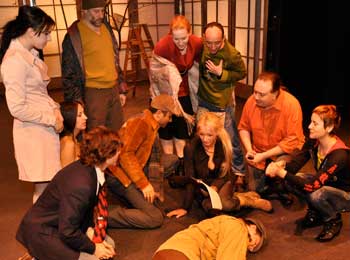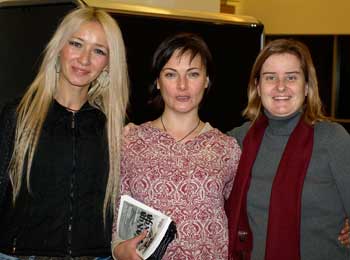About the Playwright
Olga Mukhina was born in 1970 to two geologists living in Moscow. When she was six years old, the family moved to Ukhta in the far north, where she spent the remainder of her childhood. Mukina returned to Moscow as a young adult with the hope of writing films. After several unsuccessful efforts to gain admission to a screenwriting program at the cinema institute, she turned her attention to the stage. Based upon her first play, The Sorrowful Dances of Ksaveria Kalutsky, she was invited to study dramatic writing at the Gorky Institute in 1991. She wrote two other plays, Alexander August (1991), and The Love of Karlovna (1992), before crafting the work that established her position as an important new voice in Russian theatre, Tanya-Tanya, in 1994. This play was introduced to the public in June of 1995, through a staged reading at Lyubimovka, which had been the suburban estate of Konstantin Stanislavsky. Early the next year, a full production of Tanya-Tanya opened to great acclaim at the Fomenko Theatre in Moscow. This production has been marked by some critics as instrumental in convincing critics and audiences in Russia that contemporary playwriting was worthy of their attention. According to critic and translator John Freedman, “This is the play that broke the vicious circle, that proved to large numbers of people with disparate backgrounds, styles and tastes, that a contemporary play could look, sound and feel good when performed on the stage” (Introduction xii). In the ensuing years, new drama was increasingly presented at festivals and produced by new theatre companies.
Part of the sensation created by Mukhina’s work may be due to its dramatic departure from the dominant styles of playwriting during previous decades. Mukhina turns her attention to the realm of the personal and the emotional, with characters lost in a swirl of poetic images and desires. According to Freedman, “Mukhina is a writer of a completely different sensibility. She is a poet playwright, a dreamer capable of following the raptures of life into enchanted territory while never losing sight of the harsh limits and killing pressures of reality. Mukhina's characters soar in their aspirations even as their lives figuratively are dashed on the rocks” (“Bringing Forth Brilliance”). The impact of her poetic vision quickly spread beyond Russia’s borders. Within a year of its first Moscow production, Tanya-Tanya was translated into five languages. The Moscow production toured to Poland, Germany, and Bulgaria. Staged readings were presented in 1997 at the Avignon Festival and, in 1998, at the New York Theatre Workshop. An English translation by John Freedman was published in 1999 and later presented in a reading at Portland Stage and performed at the California Institute of the Arts. Mukhina’s subsequent plays include YoU (1996), which was produced at the Moscow Art Theatre and Flying (2004), which has been made into a film to be released in 2010.
Works Cited
Freedman, John. Introduction. Two Plays by Olga Mukhina. London: Routledge, 1998. Print.
---. “Bringing Forth Brilliance From Her Creative Cauldron.” Rev. of YoU at the Moscow Art Theatre. The Moscow Times. 27. Sept. 2001. LexisNexis Academic.
17 Nov. 2009. Web.

Olga Mukhina (with script) surrounded by the Towson University company of Tanya Tanya. December 2009. Photo: Jay Herzog

From left, Olga Mukhina, Russian actress Tatiana Karpekina, and Kate Moira Ryan. Towson University. December 2009. Photo: Robyn Quick



